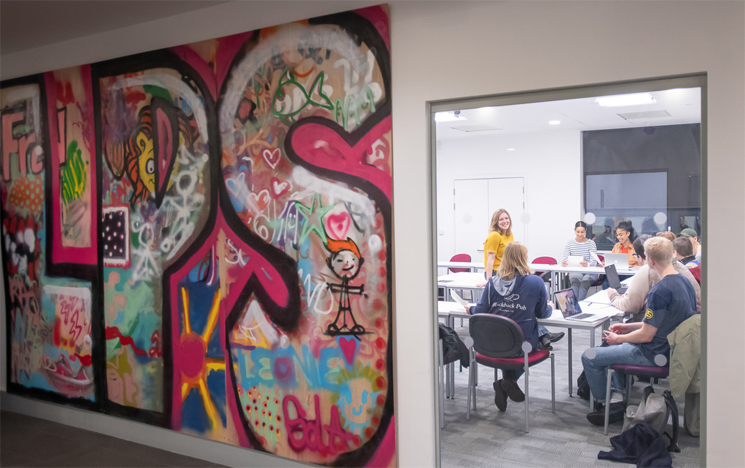Sociology and Criminology
Study at a university ranked 9th in the UK for sociology*. Browse our sociology modules below, and if you’re unsure what to study, follow our top tips for how to choose a module.

Browse our modules
You can see our full list of sociology modules below.
Year 1
Year 2
-
Autumn Semester
- Class, Culture & Conflict: A View from The Inside
- Classical Sociological Theory
- The Climate Crisis, Criminology & the Justice System
- Differently Bodied Beings and Ethnographic Encounters (Aut)
- Digital Societies
- Gender, Crime and Justice
- A Sociology of Generations and Social Change? From Passive to Active Generations
- Health across the Lifecourse
- Identity, Violence and Transgression
- Lions Den: An Exploration (A)
- Migration and Integration (Aut)
- Police and Policing
- Police and Policing (Elective)
- Doing Social Research: working with quantitative data
- Sociology of Emotions and Mental Health
- Victimology and Emotion
-
Spring Semester
- Capitalism, Work & Precarity (Spr)
- Citizenship, Activism and Resistance
- Class, Culture & Conflict: A View from The Inside
- Digital Societies
- Drugs, Crime and Deviant Leisure
- Education and Inequality
- Health across the Lifecourse
- Identity, Violence and Transgression
- Migration and Integration (Spr)
- Professional Skills: Career Management Kickstart
- Punishment and Penology
- Doing Social Research: working with qualitative data
- Sociology of Emotions and Mental Health
- The Alchemy of Race and Racism (Spring)
- The Politics of Criminalisation (Spring)
- The Sociology of Human Rights
Year 3
- Autumn & Spring Teaching
-
Autumn Semester
- (Im)mobilities and the Criminal Justice System
- Capitalism, Growth, and Ecological Crisis
- Class, Power and the State (Aut)
- Coloniality, Racism and Inequality
- Crimes against Humanity (Aut)
- Critical Perspectives on Terrorism
- Digital Activism and Citizenship in Datafied Societies
- Sociology of Family, Reproduction & Care (Aut)
- Medicine and the Body
- Migration, Identity, and Home
- Neurocriminology
- Riots, Strikes, Revolts
- Sexualities / Intimacies / Intersections (Aut)
- Technology and the Human
- Temporalities - Histories - Hauntologies (Aut)
- The Body (Aut)
- The Death Penalty
- Transcendence, Devotion and Desire
-
Spring Semester
- (Im)mobilities and the Criminal Justice System
- Capitalism, Growth, and Ecological Crisis
- Coloniality, Racism and Inequality
- Crimes against Humanity (Spr)
- Criminology of Violence and Death
- Critical Perspectives on Terrorism
- Sociology of Family, Reproduction & Care (Spr)
- Identity & Interaction
- Inequalities Across the Divides
- Medicine and the Body
- Migration, Identity, and Home
- Neurocriminology
- Organised Crime from a Global Perspective (Spr)
- Riots, Strikes, Revolts
- Sexualities / Intimacies / Intersections (Spring)
- Sociology of Care: caring and work (Spr)
- Speculative Fictions and the Critique of Our Present (Spr)
- Surveillance, Technology and Control
- Technology and the Human
- Temporalities - Histories - Hauntologies (Spr)
- The Body (Spr)
- Transcendence, Devotion and Desire
- Visual Criminology (Spr)
Not sure how to choose?
Follow our top tips for choosing your modules. You can also find out about our teaching structure, assessment process and how your credits transfer back to your home institution.
Find out more.
Which school will I study in?
You'll study in the Department of Sociology which is part of the School of Law, Politics and Sociology.
Our academics are experts in topics such as social justice, gender inequalities, identity, health care and migration.
Find out more.
Our sociology research
Our researchers are influencing and driving public debates and policy developments worldwide. We strive to better understand our world by developing a deeper theoretical understanding, and seek to innovate across sociology, criminology, and numerous interdisciplinary fields.
Our research influences the way we teach, and you learn from academics at the forefront of their fields.
Find out more.
Contact us
If you are studying at Sussex for a semester or year and have questions, email sussexabroad@sussex.ac.uk.
*QS World University Rankings by Subject 2020 **(Our campus is nine minutes by train from Brighton & Hove) survey by accommodation providers Student Living by Sodexo. Rankings based on full undergraduate degree at Sussex.